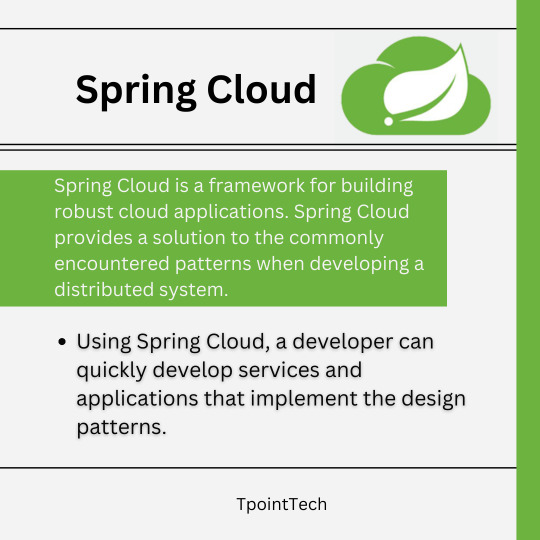#java microservice
Explore tagged Tumblr posts
Text
https://codeonedigest.blogspot.com/2023/07/amazon-ec2-instance-setup-and-running.html
#youtube#video#codeonedigest#microservices#aws#microservice#springboot#spring boot#aws ec2 server#aws ec2 instance#aws ec2 service#ec2#aws ec2#spring boot microservices#java microservice#microservice tutorial
0 notes
Text
Java Modules in Modern Microservices: A Winning Combination
In the world of modern software development, microservices architecture has become a popular choice for building scalable and maintainable systems. However, as the number of services grows, managing dependencies and maintaining a consistent architecture can become a challenge. This is where Java modules come in – a powerful tool for organizing and structuring your codebase. Java modules, introduced in Java 9, provide a way to group related classes and interfaces into a single unit, making it easier to manage dependencies and maintain a consistent architecture. By using Java modules, you can create a modularized architecture that is easy to understand, test, and maintain. In this article, we'll explore the benefits of using Java modules in modern microservices architecture and provide best practices for implementing them effectively. We'll also discuss how IAMDevBox.com can help you get started with Java modules and microservices. Read more: Java Modules in Modern Microservices: A Winning Combination
0 notes
Text
youtube
Monolithic vs Microservices — What Should You Build
Choosing the wrong architecture too early can cost you years of tech debt! Not every product needs microservices Not every startup should start monolithic Let’s break it down :- ❓When will you need Monolithic architecture? Monolith is focused, fast, and manageable ✅ You’re building an MVP or early-stage product ✅ Your app is simple, with tightly coupled features ✅ You need to launch quickly with a small dev team ✅ Deployment speed matters more than modularity ❓When will you need Microservices? Microservices are scalable, flexible, and complex ✅ You’ve scaled and need feature-specific deployments ✅ Your teams work on different modules in parallel ✅ You want fault isolation and independent scaling ✅ Continuous deployment and DevOps are in place ⚠️ Don’t follow trends. Follow your product’s stage and your team's capability. Get expert guidance tailored to your tech stack and business goals. Call - +91 9073754444 or book a FREE consultation - https://wseinfratech.com/book-a-free-consultation
#distributed systems#microservices#java#monolith#monolith vs microservices#what is microservices#monolithic application#website development#software development#software development company#custom software development#custom website development#java microservices#web development company#aws microservices#api#api gateway#monolithic structure#website architecture#what is api gateway#web development planning#building api#custom software#custom website#Youtube
1 note
·
View note
Text
Boost Microservices Startup-Spring Boot, CDS & Java Project Leyden
Estimated reading time: 14 minutes In the fast-evolving landscape of cloud-native and serverless applications especially microservices, runtime efficiency is paramount. Performance requirements might expect some microservices to start and be available without any measurable delays. Due to startup delays inherent in the Java platform, it is difficult to have applications booting with sub-second…

View On WordPress
#Ahead of Time Cache#Ahead of Time Computation#AOT#AOT Java#cds#Class Data Sharing#jdk24#jdk25#Microservices#Microservices Architecture#openjdk#project leyden#runtime efficiency#Spring Boot Microservices
0 notes
Text
Powering Scalable Digital Solutions with Microservices: CloudKodeForm’s Expertise in Java and Spring Boot.
In today's world of digital change, businesses need to be quick and able to grow easily. Old-style monolithic apps often can't keep up with these demands. That’s why many companies are turning to microservices. This approach breaks large, complex applications into small, independent parts. CloudKodeForm leads this shift, offering advanced solutions based on a strong micro services design.

What are microservices and why are they important? Micro services are a way of building apps as small, separate services that work together. Each one handles a specific task. This makes development faster and makes it easier to add features or fix issues. Scaling a micro services system is simpler, and maintenance costs go down.
Choosing a micro services setup helps businesses develop more freely. They get more reliable systems and can introduce new ideas quickly without changing everything. CloudKodeForm creates micro services systems that are strong, easy to grow, and built for good performance.
Expertise in Java Micro services are common in big business apps. Java's stability, maturity, and large toolkit make it an excellent choice. CloudKodeForm uses Java to develop secure, easy-to-scale, cloud-ready micro services that match modern business needs.
Our experienced Java developers follow proven design rules. They build systems that stay available, reliable, and easy to manage. Whether starting a new Java micro service or updating an old monolith, CloudKodeForm supports every step of the process.
Java works well on many cloud platforms. Its strong libraries and frameworks help build microservices architecture that grow with your business.
Building Modern Applications with Spring Boot Microservices Spring Boot is a popular framework for making Java microservices. It simplifies backend work and makes deployment easier. CloudKodeForm has deep experience with Spring Boot microservices that are lightweight, quick, and easy to launch in cloud platforms like AWS, Azure, and Google Cloud.
Using Spring Boot with tools like Spring Cloud, Docker, and Kubernetes makes deploying, finding services, and handling errors simple. CloudKodeForm uses these tools to build secure APIs, connect with other services, and handle high traffic and complex tasks.
Spring Boot’s auto-setup and built-in servers help develop microservices fast. CloudKodeForm uses these features to deliver secure APIs, link with third-party tools, and build platforms that can grow.
Why Businesses Trust CloudKodeForm As companies grow, their software needs change. CloudKodeForm offers advice and help to build micro services that scale easily. Their team has deep knowledge in making systems that are easy to maintain, test, and run in production.
Clients choosing CloudKodeForm do so because they get full support from start to finish. They handle design, development, deployment, and ongoing monitoring. Their systems are built to be safe and scalable, following best practices in security and data safety. We are ready for cloud setup with containers and orchestration.
Industries Served CloudKodeForm has worked with many industries, including finance and healthcare. We build microservices for secure transactions and managing customer data. Our experience helps companies improve their systems and meet their needs.
#node js microservices#microservices and spring boot#cloud microservices#java micro services#microservices in node
0 notes
Text
Modificación de Consultas en Feign con Spring Boot
¿Necesitas modificar parámetros de consulta en Feign con Spring Boot? Aprende cómo resolver el problema de actualización de queries usando RequestInterceptor y evita errores comunes. ¡Solución y test incluidos! 🚀 #Feign #SpringBoot
Resumen Este documento describe un problema común al trabajar con Feign en Spring Boot, donde se requiere modificar dinámicamente los parámetros de consulta (query parameters) en una solicitud HTTP. Se detalla el problema, la solución implementada y las consideraciones clave para evitar errores similares en el futuro. Contexto En una aplicación Spring Boot, se utilizó Feign como cliente HTTP…
#BackendDevelopment#Java#JavaCode#JavaDevelopment#JavaDevelopment SpringFramework UnitTesting JavaProgramming BackendDevelopment Microservices SoftwareTesting JavaCode SpringBootApp#JavaProgramming#JUnit#Microservices#SoftwareTesting#SpringBoot#SpringBootApp#SpringFramework#UnitTesting
0 notes
Text

Spring Cloud . . Looking to build scalable, flexible, and resilient microservices? Spring Cloud has you covered! 🌐💡 Seamlessly connect your services, handle configurations with ease, and streamline your cloud journey. 🌈✨
👉 Explore more about Spring Cloud today: https://bit.ly/43NqsV2
0 notes
Text
Introduction to Java Spring Microservices: Understanding the Basics

Embarking on the Journey of Java Spring Microservices: Exploring the Basics! Delve into microservices architecture with Java Spring and unravel the fundamental concepts and principles behind it. LSET's comprehensive guide provides insights into building scalable and resilient microservices-based applications using Java Spring technologies. Plus, with London School of Emerging Technology (LSET) Java Spring Microservices Course, you'll receive expert-led instruction and hands-on experience to master the intricacies of developing microservices with Java Spring. Join us and empower yourself to harness the power of microservices architecture, driving innovation and efficiency in your software projects.
Enrol @ https://lset.uk/ for admission.
0 notes
Text
What are the challenges faced when monitoring and logging in microservice architecture?
Inadequate monitoring and logging make it challenging to identify and troubleshoot issues within microservices. Solution: Implement centralized logging and monitoring solutions for comprehensive visibility. Utilize distributed tracing to track requests across multiple microservices. Terminology: Centralized Logging And Monitoring: such as the ELK Stack (Elasticsearch, Logstash, Kibana),…
View On WordPress
#Centralized Logging And Monitoring#Distributed tracing#interview#interview questions#Interview Success Tips#Interview Tips#Java#Microservice Monitoring and Logging#Microservices#programming#Senior Developer#Software Architects
0 notes
Text
Building Applications with Spring boot in Java
Spring Boot, a powerful extension of the Spring framework, is designed to simplify the process of developing new Spring applications. It enables rapid and accessible development by providing a convention-over-configuration approach, making it a preferred choice for many developers. This essay delves into the versatility of Spring Boot, exploring the various types of applications it is commonly used for, highlighting its features, benefits, and practical applications across industries.
Origins and Philosophy
Spring Boot was created to address the complexity often associated with Spring applications. By offering a set of auto-configuration, management, and production-ready features out of the box, it reduces the need for extensive boilerplate configuration. This framework adheres to the "opinionated defaults" principle, automatically configuring Spring applications based on the dependencies present on the classpath. This approach significantly accelerates development time and lowers the entry barrier for businesses looking to hire Java developers.
Web Applications
Spring Boot is widely recognized for its efficacy in building web applications. With embedded servers like Tomcat, Jetty, or Undertow, developers can easily create standalone, production-grade web applications that are ready to run. The framework's auto-configuration capabilities, along with Spring MVC, provide a robust foundation for building RESTful web services and dynamic websites. Spring Boot also supports various templates such as Thymeleaf, making the development of MVC applications more straightforward.
Microservices
In the realm of microservices architecture, Spring Boot stands out for its ability to develop lightweight, independently deployable services. Its compatibility with Spring Cloud offers developers an array of tools for quickly building some of the common patterns in distributed systems (e.g., configuration management, service discovery, circuit breakers). This makes Spring Boot an ideal choice for organizations transitioning to a microservices architecture, as it promotes scalability, resilience, and modularity. Microservices is one important reason why businesses look to migrate to Java 11 and beyond.
Cloud-Native Applications
Spring Boot's design aligns well with cloud-native development principles, facilitating the creation of applications that are resilient, manageable, and observable. By leveraging Spring Boot's actuator module, developers gain insights into application health, metrics, and audit events, which are crucial for Java development services companies maintaining and monitoring applications deployed in cloud environments. Furthermore, Spring Boot's seamless integration with containerization tools like Docker and Kubernetes streamlines the deployment process in cloud environments.
Enterprise Applications
Spring Boot is adept at catering to the complex requirements of enterprise applications. Its seamless integration with Spring Security, Spring Data, and Spring Batch, among others, allows for the development of secure, transactional, and data-intensive applications. Whether it's managing security protocols, handling transactions across multiple databases, or processing large batches of data, Spring Boot provides the necessary infrastructure to develop and maintain robust enterprise applications.
IoT and Big Data Applications
The Internet of Things (IoT) and big data are rapidly growing fields where Spring Boot is finding its footing. By facilitating the development of lightweight, high-performance applications, Spring Boot can serve as the backbone for IoT devices' data collection and processing layers. Additionally, its compatibility with big data processing tools like Apache Kafka and Spring Data makes it suitable for building applications that require real-time data processing and analytics.
Summary
Spring Boot's versatility extends across various domains, making it a valuable tool for developing a wide range of applications—from simple CRUD applications to complex, distributed systems. Its convention-over-configuration philosophy, combined with the Spring ecosystem's power, enables developers to build resilient, scalable, and maintainable applications efficiently.
In essence, Spring Boot is not just a tool for one specific type of application; it is a comprehensive framework designed to meet the modern developer's needs. Its ability to adapt to various application requirements, coupled with the continuous support and advancements from the community, ensures that Spring Boot will remain a crucial player in the software development landscape for years to come. Whether for web applications, microservices, cloud-native applications, enterprise-level systems, or innovative fields like IoT and big data, Spring Boot offers the flexibility, efficiency, and reliability that modern projects demand. The alternative Spring cloud also offers variety of advantage for developers building microservices in java with spring boot and spring cloud.
#software development#web development#mobile app development#java full stack developer#java application development#javaprogramming#microservices
0 notes
Text
Simplify Java Microservices Management with Helm
Helm is a widely-used Kubernetes package manager that simplifies the process of packaging and deploying your Java applications. In this post, we'll explore how Helm can help you streamline your development workflow and make the most of your Java microservices. With Helm, you can easily create, manage, and upgrade your Java applications with ease. Whether you're a developer or Development operations, engineer, Helm is an essential tool for any Java-based project. When it comes to deploying your Java application, Helm provides a range of benefits. For starters, it allows you to package your application and its dependencies into a single, easily manageable unit. This means you can deploy your application quickly and efficiently, without worrying about the underlying complexity. Helm also provides a range of features, including automatic versioning, rollbacks, and updates, which make it easy to manage your application's lifecycle. At IAMDevBox.com, we understand the importance of streamlining development workflows and simplifying the process of deploying Java applications. That's why we're excited to share this Helm tutorial with you. Whether you're new to Helm or an experienced user, this guide will help you get the most out of this powerful tool. So, what are you waiting for? Dive in and start simplifying your Java microservices management today! Read more: Simplify Java Microservices Management with Helm
0 notes
Text

Greetings from Ashra Technologies we are hiring
#ashra#ashratechnologies#jobs#hiring#recruitingpost#hybrid#hybridwork#news#jobsearch#jobseekers#jobalert#jobpost#opentowork#immediate#immediateopening#java#microservices#kafka#kafkadeveloper#springboot#api#restfulapi#json#webservices#xml#agile#xslt#unix#linux#plsql
0 notes
Text
Java is an established programming language and an ecosystem that has dominated the software business for many years. According to TIOBE index rankings, Java was the #1 popular programming language in 2020 and the fourth best currently for bespoke software development.
The key factor for its intensive popularity is its security, which is why it is extensively used in a broad range of disciplines such as Big data processing, AI application development, Android app development, Core Java software development, and many more. It provides a large set of tools and libraries, as well as cross-platform interoperability, allowing customers to build applications of their choice.
#java development#future of java#java trends#java developer for hire#Java programming language for cloud-native development#Java frameworks for microservices architecture#Java ecosystem tools for DevOps automation#Java web development trends in 2023#Agile Java development with DevOps best practices#software development company
0 notes
Text

🚀 Elevate Your Java Skills with the Best Spring Boot Training Institute in Electronic City Bangalore - eMexo Technologies! 🌟☕
🌐 Learn more: https://www.emexotechnologies.com/courses/spring-boot-certification-training-course/ 📞 Contact us: +91-9513216462
🔍 Searching for top-tier Spring Boot Training in Electronic City Bangalore? Your quest ends here! At eMexo Technologies, we're committed to nurturing your journey in Spring Boot development.
☕ Our program features:
Comprehensive Spring Boot Training in Electronic City Bangalore for all skill levels. Hands-on projects that solidify your expertise in creating robust Java applications. Expert mentorship from industry professionals who excel in Spring Boot. Your gateway to lucrative careers with a Spring Boot Course in Electronic City Bangalore. 🏆 Ready to script a future powered by Spring Boot excellence? Join us now at eMexo Technologies!
springboot #SpringBootTrainingInstitute #ElectronicCityBangalore #eMexoTechnologies #SpringBootCourse #BangaloreLearning #electroniccity #bangalore #springframework #microservices #education #springtraininginelectroniccity #springcourseinelectroniccity #springtraininginstituteinelectroniccity #java #learning #top #best #trending #popular #courses #course #traininginstitute #careers #jobs #training #career #job #interview #placement
#emexotechnologies#electroniccity#course#bangalore#education#learning#traininginstitute#careers#training#jobs#springboot#springboottraininginstituteinelectroniccity#sprinboottraininginelectroniccity#springbootframework#springframework springframeworktraininginstituteinelectroniccity emexotechnologies springframeworkonline springframeworkonlinecourse spring#springtraininginelectroniccity#microservices#java#courses#trending#top#best#popular#springcourseinelectroniccity
0 notes
Video
youtube
Synchronous Messaging Design Pattern for Microservice Explained with Exa... Full Video Link https://youtu.be/yvSjPYbhNVwHello friends, new #video on #synchronous #messaging #communication #sync #designpattern for #microservices #tutorial for #developer #programmers with #examples are published on #codeonedigest #youtube channel. @java #java #aws #awscloud @awscloud @AWSCloudIndia #salesforce #Cloud #CloudComputing @YouTube #youtube #azure #msazure #codeonedigest @codeonedigest #microservices #microservices #microservices #whataremicroservices #microservicesdesignpatterns #microservicesarchitecture #microservicestutorial #synchronouscommunication #synchronousmessagepassing #synchronouscommunicationincomputerarchitecture #synchronouscommunicationbetweenmicroservices #synchronouspattern #microservicedesignpatterns #microservicedesignpatternsspringboot #microservicepatterns #microservicepatternsandbestpractices #designpatterns #microservicepatternsinjava
#youtube#microservices#design patterns#microservice design pattern#microservice pattern#synchronous messaging#synchronous communication#synchronous messaging pattern#synchronous communication pattern#design pattern#java design pattern#microservice
1 note
·
View note